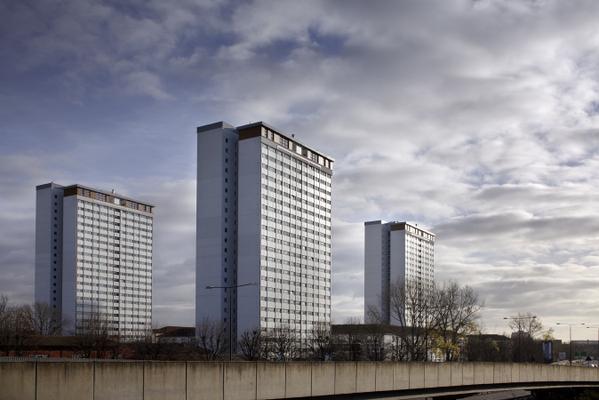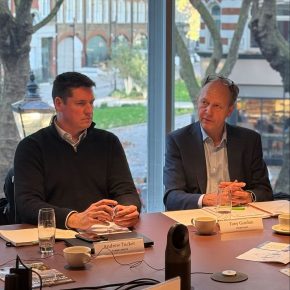
New report on social implications of upgrading large high-rise estates
In 2012 the London School for Economics and ROCKWOOL published High Rise Hope, a path-breaking investigation into the social impact of whole building energy efficiency refurbishments in residential tower blocks.
Following this research, LSE Housing and Communities went back to the Edward Woods estate in Shepherd’s Bush, in the London Borough of Hammersmith and Fulham, to re-interview residents once the upgrading work was complete.
Rockwool and the Edwards Woods estate scheme
The Edwards Woods estate scheme was led and managed by the Hammersmith and Fulham Council, who commissioned Energy Conscious Design (ECD) Architects and the building contractors Breyer for the project which began in 2011.
Ambitious and complex in nature, it has primarily involved remedial work on the concrete building structure, external cladding of the blocks with ROCKWOOL’s External Wall Insulation System and the installation of solar panels to provide 82,000 kWh of electricity annually for lifts and communal lighting.
The scheme was used as a model case study for how the Green Deal and Community Energy Saving Partnership (CESP) whole building’ approach would work in high-rise, socially rented estates.
High Rise Hope Revisited
High Rise Hope Revisited is the second part of the LSE’s study at the Edward Woods estate. In 2012, an initial report, High Rise Hope, interviewed residents during the renovation works.
Following this research, LSE returned to the estate when all the upgrading work was complete to highlight lessons learned and assess the social and community impact of transforming a 1960s local authority housing estate into a landmark, high rise model of social housing.
Among the most significant lessons learned from the project was the importance of communication with residents.
High Rise Hope Revisited recommends regular community updates are necessary to ensure tenants feel part and informed of improvement works.
In addition to initial consultations, the report suggests more ongoing support helps to improve wider understanding of the objectives of regeneration, and to explain any delays that occur.
The residents of Edward Woods cited better management of the works as their overriding suggestion for improvement.
LSE’s key findings in the High Rise Hope Revisited report
- Overall, residents value living on the estate. Residents on the Edward Woods estate like their homes, they find their flats comfortable and have a generally high quality of life
- residents are positive about the estate and their homes and generally feel safe living there
- 78% now describe their quality of life in their home as good or excellent, compared with 68% in 2011, showing a marked improvement
- people are generally proud to live on the estate, with many saying this had improved since the regeneration. Residents overwhelmingly say they enjoy living there
Professor Anne Power, LSE Housing and Communities: Edward Woods has a fascinating history because it is a large, concrete, high-rise, council-owned estate, housing a very low income community in 23 storey tower blocks and maisonettes in a very busy part of West London. It is popular, well managed, attractive and fully occupied. It shows that with careful on-site management, high-rise estates can work, if they are also made energy efficient. This is crucial so that residents can pay their rent, meet basic costs and escape fuel poverty.
Darren Snaith, Director of Refurbishment and Regeneration at ROCKWOOL: High Rise Hope Revisited shows that whilst this type of refurbishment scheme can help alleviate fuel poverty, the transformation of the visual appearance of Edward Woods at both estate and wider neighbourhood scale has improved the sense of well-being of residents, making the area a more attractive environment to live. We are delighted to have partnered with the LSE on this important research project which will provide invaluable lessons for other local authorities keen to implement large scale energy efficiency schemes. In fact, the lessons learned have already been put to work in an upcoming energy efficiency project, the refurbishment of Wilmcote House by Portsmouth City Council. It shows that fuel poverty can be alleviated and marked improvements to the quality of high rise living achieved, when accompanied by proper support and advice for tenants.
Link to download the full High Rise Hope Revisited’ report.
Contact:
ROCKWOOL,
Pencoed,
Bridgend,
United Kingdom,
CF35 6NY
Phone: 01635 862621
Fax: 01656 862302
Visit Supplier's page
Latest news

21st February 2025
ASSA ABLOY EMEIA: Save valuable time and money with a seamless switch to programmable digital keys
In 2025, access management can be a whole lot easier. By making access part of their digital processes, businesses can put time-consuming key management and the cost of changing the locks firmly behind them. Making this switch is a lot easier than many people think, as ASSA ABLOY explains here…
Posted in Access Control & Door Entry Systems, Architectural Ironmongery, Articles, Building Industry News, Building Products & Structures, Building Services, Doors, Facility Management & Building Services, Health & Safety, Information Technology, Innovations & New Products, Retrofit & Renovation, Security and Fire Protection
21st February 2025
Showersave supports industry leaders in addressing Part L and Part G regulations
Showersave has sponsored and participated in a recent Building Insights LIVE roundtable on ‘Water & Energy Saving Innovations in New Build Housing’.
Posted in Articles, Bathrooms & Toilets, Bathrooms, Bedrooms & Washrooms, Building Associations & Institutes, Building Industry Events, Building Industry News, Building Products & Structures, Building Regulations & Accreditations, Building Services, Exhibitions and Conferences, Interiors, Pipes & Fittings, Plumbing, Retrofit & Renovation, Sustainability & Energy Efficiency
21st February 2025
GEZE: The importance of Specifying High Quality Door Closers on Fire Doors
Andy Howland, Sales & Marketing Director at GEZE UK, discusses why specifying high quality door closers on fire doors is important…
Posted in Access Control & Door Entry Systems, Accessibility, Architectural Ironmongery, Articles, Building Industry News, Building Products & Structures, Building Regulations & Accreditations, Building Services, Doors, Facility Management & Building Services, Health & Safety, Posts, Restoration & Refurbishment, Retrofit & Renovation, Security and Fire Protection
21st February 2025
Insight Data achieves ISO9001 recertification with zero non-conformities
Leading industry data specialist, Insight Data, has successfully achieved the prestigious recertification for ISO9001 with zero non-conformities for the fourth consecutive year.
Posted in Articles, Building Industry News, Building Regulations & Accreditations, Building Services, Information Technology, Research & Materials Testing
 Sign up:
Sign up: